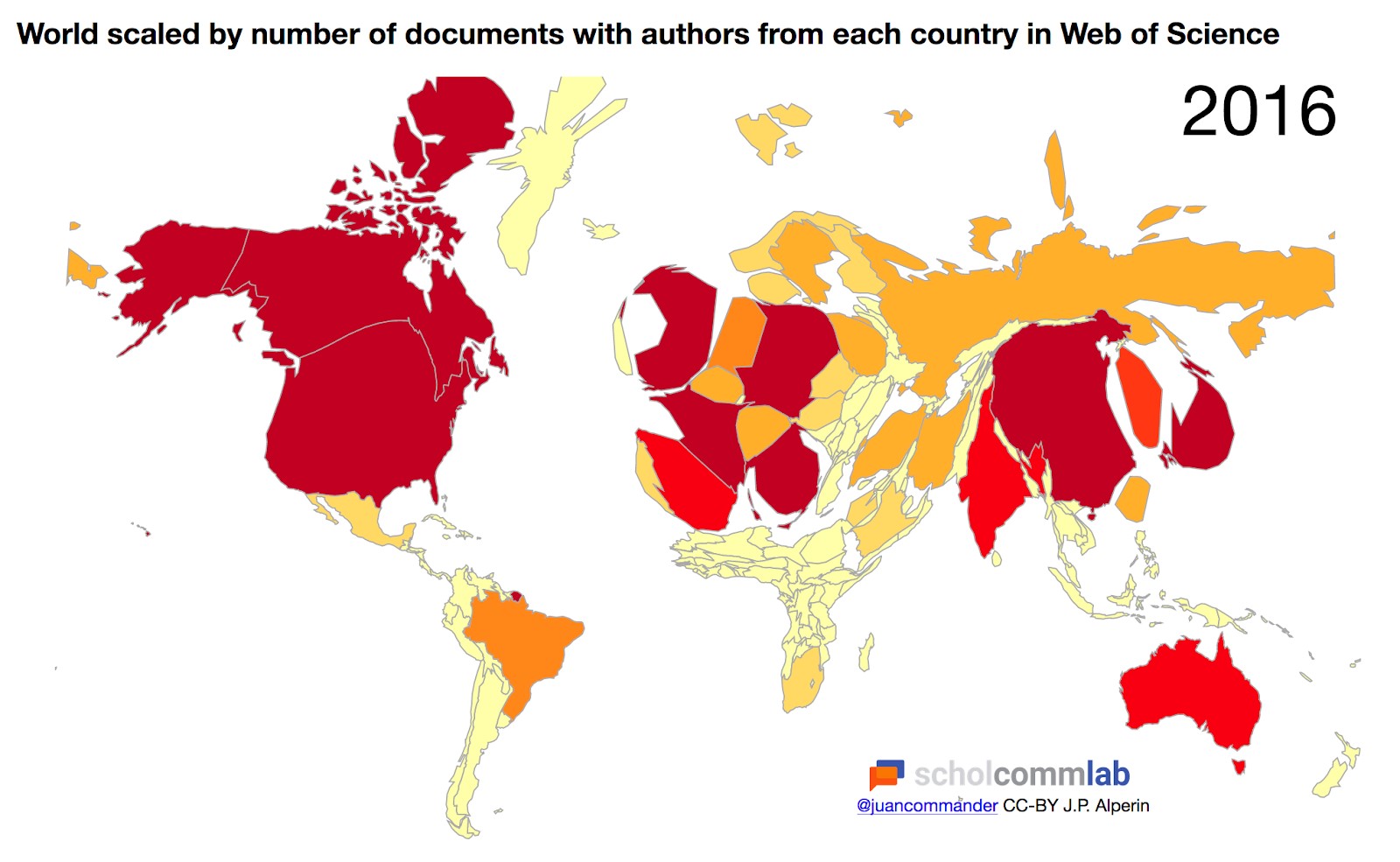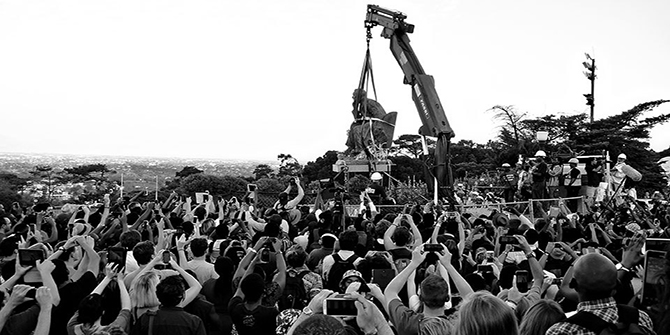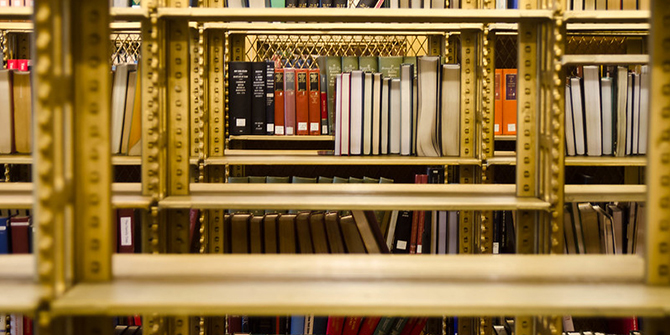The existing infrastructures of scholarship, both technological and institutional, are re-entrenching the dominance of research from and for a western audience. Corporate interests and the under-representation of local scholars create an ever-narrow vision of who research is for. If we want to reshape the way scholarly knowledge is produced and communicated, argues Angela Okune, we should question who makes the decisions and why.
This post is part of the blog and podcast series Citing Africa which explores the global construction and imbalances of knowledge production.
Where and how is scholarly knowledge produced and circulated, and with what effects? We must be wary of the over-production and representation of work from particular geographies, as well as the relegation of other locales as sites of data collection.
Existing scholarly infrastructures continue to enable and in fact re-entrench what Paulin Hountondji called ‘extroverted scientific activity’, where researchers on the African continent investigate subjects which are of interest first and foremost to a Western audience. Hountondji argued that while academic work can meet the theoretical needs and questions of the Western academy, it does not serve the societies within which the science is conducted.
This paradigm is reinforced by a growing reliance on exposure in conferences and academic journals with high Impact Factors based in the global North. An original signatory of the Budapest Open Access Initiative, critical development scholar Leslie Chan noted that often ‘the implicit message is that research from the South has to mimic that from the North, even if it means abandoning research that would contribute to local well-being, while favouring research with international appeal’. This speaks to the motivations of my own research. I ask fundamental questions about how and to whom researchers are held accountable and what role scholarly work should play in today’s late industrial moment.
I have come to understand that working outside conventional structures requires additional commitment, time, labour and social capital. For example, Abena Busia describes the challenges faced when working on the monumental Women Writing Africa (WWA) project: despite the women involved principally wanting to broadcast African women’s voices throughout the continent, the project being hosted within the US-based Feminist Press distribution network meant it was more readily available to North American and European audiences. In order to redress this issue, the co-founders together with the Feminist Press had to purposefully pursue African regional partners, volume by volume, to publish and distribute the series on the continent.
Nanjala Nyabola faced similar challenges when seeking a public library in Nairobi to launch her recent book on Kenyan politics. She was eventually able to host the event at a branch of the Kenya National Libraries, but doing so required on her part additional labour and effort. In most cases, this additional labour is neither valued nor promoted within academic review systems, and so it falls onto the shoulders of the individual scholar. To move their work outside of well-established, normative systems of scholarly knowledge circulation, these scholars must go beyond what is expected, accounted for and credited, in an already demanding system.
That this ‘double burden’ (also described elsewhere as a ‘second shift’) falls on the same scholars who already have to do more to diffuse their work is revealing of the politics and dynamics of knowledge production on/from the continent. ‘We feel pressure to do it [data and research output sharing] differently but I worry that we will not be able to,’ a Kenyan researcher admitted to me in a discussion about how communities felt exploited by normative practices of research data collection.
The drive for some scholars to work outside of conventional structures is rooted in a desire to combat an unequal representation in academic knowledge production. One proposed solution has been to increase African-authored scholarship. But focusing on the symptoms of extroverted scientific infrastructures, rather than the systems themselves, carries a risk of tokenising individuals. For example, in response to critiques about the lack of representation from the global South in Information and Communication Technologies in Development (ICTD) work, I observed at the 2015 ICTD conference an increase in rates of co-authorship between global North and global South scholars. Nonetheless, Northern scholars still appeared to drive the agenda. Although all of the research from the 24 co-authored papers at the conference took place in field sites located in the ‘global South’, only four had primary authors who hailed from institutions situated in the global South itself. Studies by Lam (2014) and Bai (2018) echo this finding.
Dependency on the Northern primary researcher who determines who they want to cite or bring into the academic system is therefore perpetuated: ‘I met an Ethiopian student in Ethiopia and I just decided to bring him to the US to be my student!’ a tenured professor at an American university mentioned to me. ‘I think my biggest impact to my academic field will be that I helped get more Africans into it.’ These examples illustrate the limit of what we can expect if we only focus on individual-led solutions to structural issues, and continue to rely on, and thus reify, traditional scholarly channels and practices.
Rachel Strohm and Edwin Adjei critiqued the establishment of the Centre for Public Authority and International Development (CPAID), which is hosted at the LSE Firoz Lalji Centre for Africa in partnership with African universities, funded by a £5 million, five-year grant from the Economic and Social Research Council. While the CPAID centre works with local researchers, they noted that funders continue to invest in centres of knowledge about Africa hosted outside of Africa, rather than primarily support institutions and scholarly infrastructures based on the continent and focused on African audiences. Strohm asked: ‘Why are Northern academics so good at studying inequality and uneven post-colonial power dynamics in the South, and so bad at recognizing their own role in perpetuating inequality within the international scholarly community?’ She concluded: ‘We must be missing so many interesting voices, so many valuable contributions to knowledge, because we’re systematically underinvesting in African academics. Spending £5 million to set up a research centre in the UK rather than somewhere like Accra or Nairobi (or Tamale or Eldoret or Kisangani) only perpetuates the problem.’
Responses to Strohm’s post highlight that initiatives attempting to rectify such inequalities in investments in African research already exist. Adjei points to CODESRIA’s long-standing work since its founding in 1973 towards remedying the unequal circulation of African scholarship, as well as more recent work from the African Studies Association of Africa (ASAA), an Africa-based association which promotes Africa’s specific contributions to knowledge about the peoples and cultures of Africa and the Diaspora. The association’s third biennial conference will take place in Nairobi in October 2019; the choice of which conference to attend is in fact a demonstration of ethical orientation and politics. Whose scholarship and institutions are you building through your participation and payment of conference fees? (Note the ASAA call for panels closes on June 15th!)

There is also a neglected commercial layer to these discussions. Emerging studies have shed light on the expansion of commercial publishers into all parts of the scholarly research life cycle, including data analytics for ‘impact factors’, university rankings and management of research data. The diagram above illustrates the extent of Elsevier’s expansion through its acquisitions (illustrated by logos) of companies across the research process. The growing consolidation of research infrastructure by private industry actors such as Elsevier make working outside of mainstream forms of knowledge production even more challenging. Given the high costs of non-participation in the system, many researchers, especially those in contexts with little government or funder support, have few options but to entrust their knowledge to these corporations. Given the already uneven landscape of publishing power, what are the implications for the diversity of knowledge production in such moves towards consolidation?
The map below illustrates the high imbalance in regional representation in published academic work in the Web of Science and demonstrates how existing academic publishing infrastructures privilege certain regions and types of knowledge. Scholars concerned with decolonising knowledge need to turn a critical gaze on the structures through which academic knowledge circulates and who owns and makes decisions about these structures.

The ‘replication crisis’ highlighted by Laura Mann in her Citing Africa blog post has led many concerned scholars towards Open Science – the movement to make scientific research open access and accessible across society. The increasing push for pre-analysis plans, publishing of research instruments and datasets, among other demands, is viewed as a way to increase transparency and ‘better science’. As growing critiques of Open Science have argued, however, such practices and tools do not necessarily challenge the powerful actors governing the Science industry and may in fact be re-entrenching power by creating new technical boundaries and requirements. Who is able to publish ‘openly’? And if barriers to ‘openness’ remain, will we merely deepen the over-representation of some groups over others?
Working with the Open and Collaborative Science in Development Network (OCSDNet) over the last five years, I have observed that a ‘crisis of replication’ has indeed contributed towards a growing normative push for Open Science, with a focus on tools and technologies. Despite the revolutionary rhetoric, it appears that much of the mainstream Open Science movement continues to operate under the same values and structures of the pre-crisis era, albeit with new tools and norms to revitalise its credibility.
Furthermore, the frame of what ‘counts’ as valid knowledge should reach beyond the confines of the scientific academic journal article. During the last ASAA conference, Dr. Wangui wa Goro highlighted that the university should not be considered the only site of knowledge production, and forms of knowledge like hip-hop and jazz, which fall outside of normative scholarly frames, should also be valourised given that African scholars have long worked outside these frameworks. Groups like Critical Investigations into Humanitarianism in Africa (CIHA) have also highlighted poetry, photography, dance and other visual work as important when speaking of alternative forms of knowledge and remind us that the politics of language must also be part of these considerations. While writing this blog post, outside of the university Virtual Private Network, an article on decolonising knowledge would have cost $42 USD or 4,200 Kenyan Shillings. For whom are we ultimately creating such knowledge and for what purpose? To get towards a ‘pluriverse’, more multimodal ways of doing, acknowledging accessing and credentialing scholarship are needed.
As Laura Mann prompts in her Citing Africa post: why are we all doing this work? And how do we ensure that the socio-technical infrastructures that facilitate the work are in line with those values? I argue that no matter who we cite in our academic work, as long as we continue to publish and write within existing academic systems and genres, and follow established ethical standards and protocols to keep research data locked in university office filing cabinets, the contradictions and ironies will only become more glaring and apparent. We must take real steps to reassess the values inherent in scholarly processes and publishing.
Chan has recently written that Open Science requires us:
‘[T]o think beyond the confines of the genre of the academic journal and the narrow set of standards and quality markers designed and controlled by profit driven entities … there is a need to think about enabling infrastructure for data and diverse forms of outputs and processes … there needs to be more thought given to keeping infrastructure open and public.’
The academy is increasingly becoming a space where commercial publishers are leveraging ‘platform capitalism’. Legacy multinational publishers and new players from the global North have been able to concentrate and consolidate their control of the sites of knowledge validation and distribution.
A key component missing from conversations about Open Science is that ethics are not only articulated in institutional review boards and project proposals; ethics are demonstrated in data practices, in publication venues and in decisions about whether we support the companies involved in scholarly production. The challenges are clear. We are constrained by time, funding, deadlines and hierarchies of power within the academy and the scholarly publishing world. Yet scholars concerned with the global practices of science — those interested in articulating why we are here — must get involved in rethinking how scholarly infrastructures can be decolonised and decentralised for greater equity in knowledge production. As a small step towards these aims, I have drafted a set of reflective questions as part of a self-review of my own citational practice available under a Creative Commons license to reuse and remix. My ongoing research project also more deeply engages with these questions, looking at public qualitative research data infrastructures and their making in Nairobi.
Unless we critically assess what counts as ‘high quality’ scholarly knowledge and who determines what counts, we run the risk of reproducing the ‘savage slot’ and tokenism. Using a framework of cognitive justice to describe how decolonising knowledge systems might transpire, Maja van der Velden highlights that giving ‘voice’ to knowers, or being ‘tolerant’ of alternative knowledge, is not enough: ‘cognitive justice requires resisting the hegemony of the dominant knowledge system in the struggle for survival, peace and social justice’.
To radically reshape the way scholarship and scholarly knowledge is produced and communicated requires questioning who makes the decisions about it and why. Focusing our attention on the sociotechnical knowledge infrastructures can help spark these important conversations: what might decentralised, non-hierarchical and locally controlled forms of scholarly communications and knowledge look like? From that vision we can help pluralise forms of knowledge and bring its stewardship and care closer to the communities it most concerns.
I would like to thank Titilope Ajayi, Cecelia Lynch, Leslie Chan, Laura Mann, Laurence Radford and Leah Horgan for comments on an earlier draft of this post.
This post is part of the series Citing Africa from Africa at LSE.
The views expressed in this post are those of the author and in no way reflect those of the Africa at LSE blog, the Firoz Lalji Centre for Africa or the London School of Economics and Political Science.






2 Comments